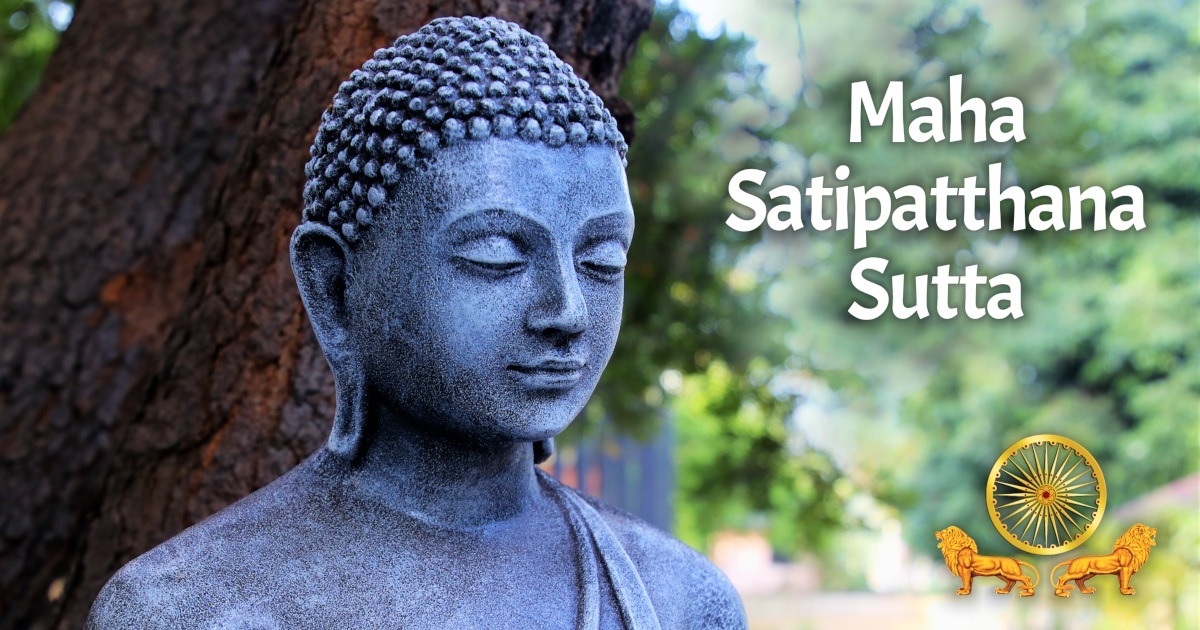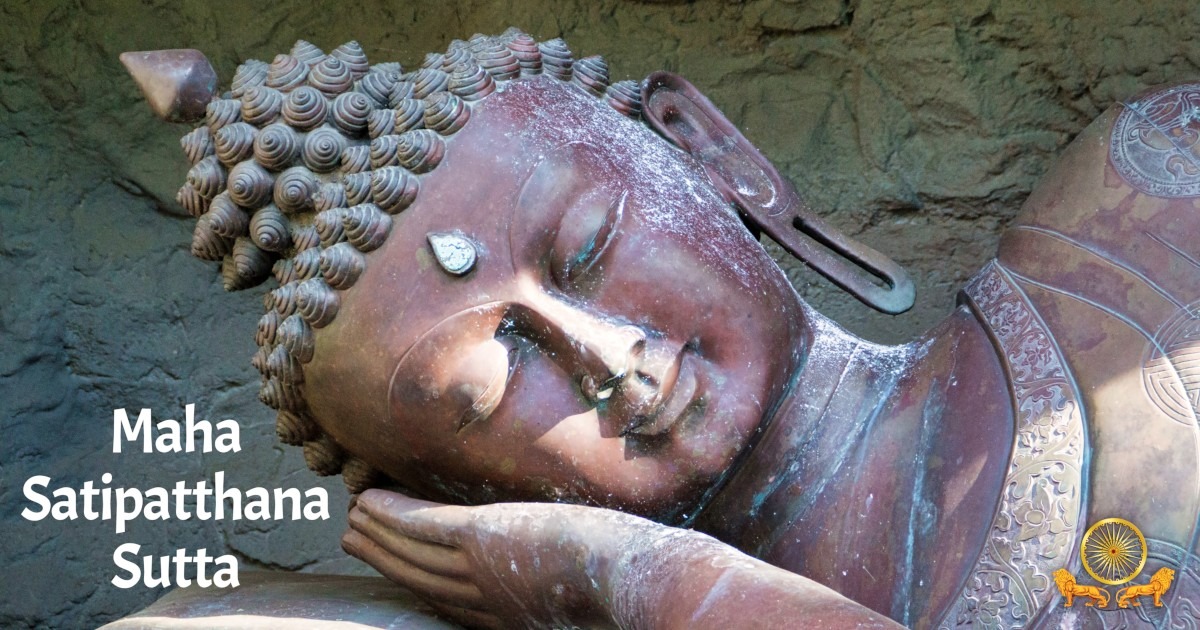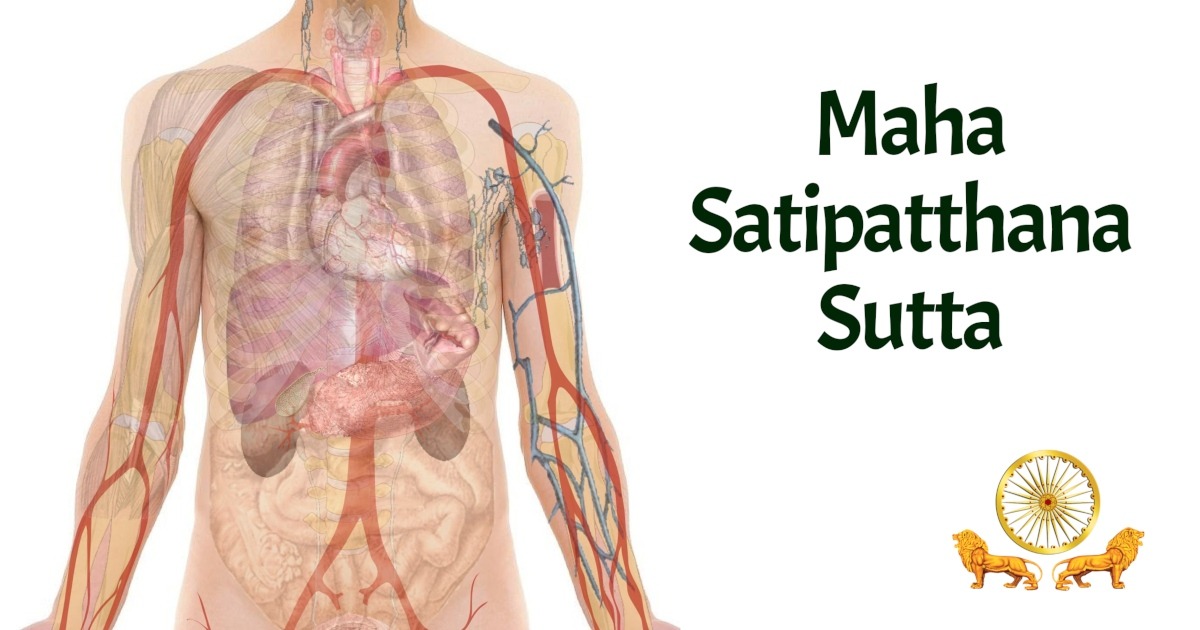4. Dhammānupassanā:
Contemplation of Phenomena
4.3 Āyatana Pabbaṁ: Section on the Sense Bases
Puna ca paraṁ bhikkhave bhikkhu / dhammesu dhammānupassī viharati / chasu ajjhattikabāhiresu āyatanesu./ Kathañca bhikkhave bhikkhu / dhammesu dhammānupassī viharati / chasu ajjhattika bāhiresu āyatanesu?/
“Again monks, a monk dwells contemplating phenomena in phenomena • in terms of the six internal and external sense bases. • And how monks, does a monk dwell contemplating phenomena in phenomena • in terms of the six internal and external sense bases?
Idha bhikkhave bhikkhu / cakkhuñca pajānāti./ Rūpe ca pajānāti./ Yañca tadubhayaṁ paṭicca uppajjati saññojanaṁ / tañca pajānāti./ Yathā ca anuppannassa saññojanassa uppādo hoti,/ tañca pajānāti./ Yathā ca uppannassa saññojanassa pahānaṁ hoti,/ tañca pajānāti./ Yathā ca pahīnassa saññojanassa āyatiṁ anuppādo hoti, / tañca pajānāti./
“Here monks, a monk understands the eye, • he understands forms, • and he understands the fetter that arises dependent on both. He understands how there comes to be the arising of the unarisen fetter, • how there comes to be the abandoning of the arisen fetter, • and how there comes to be the future non-arising of the abandoned fetter.
Sotañca pajānāti,/ sadde ca pajānāti./ Yañca tadubhayaṁ paṭicca uppajjati saññojanaṁ / tañca pajānāti./ Yathā ca anuppannassa saññojanassa uppādo hoti,/ tañca pajānāti./ Yathā ca uppannassa saññojanassa pahānaṁ hoti,/ tañca pajānāti./ Yathā ca pahīnassa saññojanassa āyatiṁ anuppādo hoti,/ tañca pajānāti./
“He understands the ear, • he understands sounds, • and he understands the fetter that arises dependent on both. He understands how there comes to be the arising of the unarisen fetter, • how there comes to be the abandoning of the arisen fetter, • and how there comes to be the future non-arising of the abandoned fetter.
Ghānañca pajānāti./ Gandhe ca pajānāti./ Yañca tadubhayaṁ paṭicca uppajjati saññojanaṁ / tañca pajānāti./ Yathā ca anuppannassa saññojanassa uppādo hoti,/ tañca pajānāti./ Yathā ca uppannassa saññojanassa pahānaṁ hoti,/ tañca pajānāti./ Yathā ca pahīnassa saññojanassa āyatiṁ anuppādo hoti,/ tañca pajānāti./
“He understands the nose, • he understands odors, • and he understands the fetter that arises dependent on both. He understands how there comes to be the arising of the unarisen fetter, • how there comes to be the abandoning of the arisen fetter, • and how there comes to be the future non-arising of the abandoned fetter.
Jivhañca pajānāti,/ rase ca pajānāti./ Yañca tadubhayaṁ paṭicca uppajjati saññojanaṁ / tañca pajānāti./ Yathā ca anuppannassa saññojanassa uppādo hoti, tañca pajānāti. Yathā ca uppannassa saññojanassa pahānaṁ hoti, tañca pajānāti./ Yathā ca pahīnassa saññojanassa āyatiṁ anuppādo hoti,/ tañca pajānāti./
“He understands the tongue, • he understands tastes, • and he understands the fetter that arises dependent on both. He understands how there comes to be the arising of the unarisen fetter, • how there comes to be the abandoning of the arisen fetter, • and how there comes to be the future non-arising of the abandoned fetter.
Kāyañca pajānāti./ Phoṭṭhabbe ca pajānāti./ Yañca tadubhayaṁ paṭicca uppajjati saññojanaṁ / tañca pajānāti./ Yathā ca anuppannassa saññojanassa uppādo hoti,/ tañca pajānāti./ Yathā ca uppannassa saññojanassa pahānaṁ hoti, / tañca pajānāti./ Yathā ca pahīnassa saññojanassa āyatiṁ anuppādo hoti,/ tañca pajānāti./
“He understands the body, • he understands tactile objects, • and he understands the fetter that arises dependent on both. He understands how there comes to be the arising of the unarisen fetter, • how there comes to be the abandoning of the arisen fetter, • and how there comes to be the future non-arising of the abandoned fetter.
Manañca pajānāti./ Dhamme ca pajānāti./ Yañca tadubhayaṁ paṭicca uppajjati saññojanaṁ,/ tañca pajānāti./ Yathā ca anuppannassa saññojanassa uppādo hoti, /tañca pajānāti./ Yathā ca uppannassa saññojanassa pahānaṁ hoti,/ tañca pajānāti./ Yathā ca pahīnassa saññojanassa āyatiṁ anuppādo hoti,/ tañca pajānāti./
“He understands the mind, • he understands mental objects, • and he understands the fetter that arises dependent on both. He understands how there comes to be the arising of the unarisen fetter, • how there comes to be the abandoning of the arisen fetter, • and how there comes to be the future non-arising of the abandoned fetter.
Iti ajjhattaṁ vā dhammesu dhammānupassī viharati,/ bahiddhā vā dhammesu dhammānupassī viharati./ Ajjhatta bahiddhā vā dhammesu dhammānupassī viharati./
“In this way he dwells contemplating phenomena in phenomena within himself, • he dwells contemplating phenomena in phenomena within another, • and he dwells contemplating phenomena in phenomena both within himself and within another.
Samudaya dhammānupassī vā dhammesu viharati,/ vaya dhammānupassī vā dhammesu viharati,/ samudaya vaya dhammānupassī vā dhammesu viharati./
“He dwells contemplating the arising of the phenomena, • he dwells contemplating the passing away of the phenomena, • and he dwells contemplating the arising and passing away of the phenomena.
Atthi dhammāti vā panassa sati paccupaṭṭhitā hoti,/ yāvadeva ñāṇa mattāya patissati mattāya./ Anissito ca viharati./ Na ca kiñci loke upādiyati./
“Mindfulness, that there are phenomena • is simply established in him • to the extent necessary for higher knowledge and mindfulness. He dwells independent, and not clinging to anything in the world.
Evampi kho bhikkhave bhikkhu / dhammesu dhammānupassi viharati / chasu ajjhattika bāhiresu āyatanesu./
That is how monks, a monk dwells contemplating the phenomena in phenomena • in terms of the six internal and external sense bases.
- Uddeso: Introduction
- 1. Kāyānupassanā: The Observation of Body
- 1.1 Ānāpāna Pabbaṁ: Section on Breathing
- 1.2. Iriyāpatha Pabbaṁ: Section on Postures
- 1.3 Sampajañña Pabbaṁ: Section on Clear Comprehension
- 1.4 Paṭikūlamanasikāra Pabbaṁ: Section on Repulsiveness
- 1.5 Dhātumanasikāra Pabbaṁ: Reflections on the Elements
- 1.6 Navasīvathika Pabbaṁ: Nine Charnel-Ground Contemplations
- 2. Vedanānupassanā: Contemplation of Feeling
- 3. Cittānupassanā: Contemplation of Mind
- 4. Dhammānupassanā: Contemplation of Phenomena
- 4.1 Nīvaraṇa Pabbaṁ: Section on the Hindrances
- 4.2 Khandha Pabbaṁ: Section on the Aggregates
- 4.3 Āyatana Pabbaṁ: Section on the Sense Bases
- 4.4 Bojjhanga Pabbaṁ: Section on the Factors of Enlightenment
- 4.5 Sacca Pabbaṁ: Section on the Four Noble Truths
- Satipaṭṭhāna Bhāvanānisaṁso: The Results of the Establishing of Mindfulness

Learn how to purchase on the main book page.




















Leave A Comment